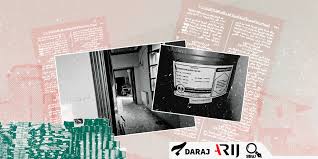A new cross-border investigation has uncovered how Syria’s notorious Fourth Division, commanded by Maher al-Assad, built one of the world’s most lucrative drug empires by exploiting pharmaceutical supply chains and regional trade routes.
The findings, drawn from official documents, exclusive testimonies, and on-the-ground reporting, reveal how tons of raw chemicals entered Syria under the guise of legitimate medical imports—only to be redirected into the clandestine production of counterfeit Captagon, an amphetamine fueling addiction across the Middle East and beyond.
Legal Imports, Criminal Ends
In 2021, Indian customs officials recorded the export of 400 barrels of diphenhydramine, an antihistamine used in cough syrups and allergy medicines, destined for a Syrian pharmaceutical company. The shipment traveled via Beirut’s port, carried paperwork approved by Syria’s ministries of health, economy, and environment, and appeared wholly legitimate.
But in December 2024, those same barrels resurfaced inside a fortified palace outside Damascus—long controlled by the Fourth Division—as part of one of the largest illegal Captagon factories ever discovered. Investigators documented how the chemicals, originally shipped from Gujarat, India, were smuggled through Lebanon and into covert facilities guarded by Maher al-Assad’s forces.
Palaces Turned Factories
The palace, located between Yaafour and Dimas on the Damascus–Beirut highway, had been sealed off for more than a decade by the Fourth Division. After the fall of the Assad regime, residents entering the compound found its halls stacked with barrels, chemical sacks, mixers, and packaging equipment for industrial-scale drug production.
Nearby, in the city of Douma, a potato chip factory seized by pro-regime businessman Amer Khiti was converted into a fortified Captagon plant. Investigators uncovered evidence that such sites were part of a vast network of covert operations stretching across Syria’s capital and countryside.
A Billion-Dollar Economy
Captagon, a powerful stimulant, has grown into one of the Middle East’s fastest expanding illicit economies. A 2024 World Bank report estimated Syria’s Captagon trade at between $1.9 and $5.6 billion annually—rivaling the country’s entire GDP.
According to a study by the Center for Operational Analysis and Research (COAR), Captagon exports far outstripped Syria’s legal trade under the Assad regime, becoming a financial lifeline for sanctioned elites, Hezbollah, and allied smuggling syndicates.
The Paper Trail
Official documents reviewed by the investigative team trace chemical imports from India, China, Germany, the UK, and Malaysia. Shipments were often disguised as cosmetics or food additives, routed through Lebanese companies before entering Syria.
The Syrian company “Al-Mustaqbal Pharmaceuticals,” tied to owner Omar Farouk Barakat, received several such consignments despite a long record of smuggling and customs violations. Experts consulted by the investigation confirmed that the volumes of diphenhydramine imported—10 tons in a single shipment—were far beyond the needs of any legitimate pharmaceutical factory.
Regional Fallout
Law enforcement agencies across Europe and the Middle East have intercepted counterfeit Captagon tablets containing diphenhydramine. German and Romanian authorities linked seized pills directly to production lines in Syria. Forensic experts warn that mixing sedatives with stimulants produces unpredictable and dangerous effects, intensifying both addiction and violent behavior.
Lebanon has become a key transit hub. Investigations into Hassan Daqo, known as the “King of Captagon,” revealed direct ties to Hezbollah and the Syrian Fourth Division. U.S. sanctions later identified Daqo as a facilitator of Maher al-Assad’s drug empire.
After Assad
Since the collapse of the Assad regime in late 2024, Syrian authorities have acknowledged that “the drug networks were directed by the heads of the former regime under Maher al-Assad’s supervision.” Officials claim they are now pursuing fugitives who fled abroad while dismantling surviving production sites across the country.
Yet the investigation shows that the legacy of Syria’s Captagon industry—built on deception, smuggling, and state complicity—will not be easily dismantled. From Gujarat’s factories to Beirut’s docks and Damascus’s palaces, the trail of barrels and blood money reveals how an entire nation was turned into the beating heart of the region’s drug trade.
This article was translated and edited by The Syrian Observer. The Syrian Observer has not verified the content of this story. Responsibility for the information and views set out in this article lies entirely with the author.
